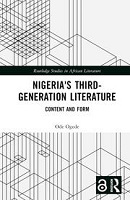Nigeria's Third-Generation Literature
Proposal review
Content and form
Author(s)
Ogede, Ode
Collection
Knowledge Unlatched (KU)Language
EnglishAbstract
This book considers the evolution and characteristics of Nigeria’s third-generation literature, which emerged between the late 1980s and the early 1990s and is marked by expressive modes and concerns distinctly different from those of the preceding era. The creative writing of this period reflects new sensibilities and anxieties about Nigeria’s changing fortunes in the post-colonial era. The literature of the third generation is startling in its candidness, irreverence as well as the brutal self-disclosure of its characters, and it is governed by an unusually wide-ranging sweep in narrative techniques. This book examines six key texts of the oeuvre: Maria Ajima’s The Web, Okey Ndibe’s Foreign Gods, Inc., Teju Cole’s Open City, Chika Unigwe’s On Black Sisters Street, Lola Shoneyin’s The Secret Lives of Baba Segi’s Wives, and Chimamanda Ngozi Adichie’s The Thing Around Your Neck. The texts interpret contemporary corruption and other unspeakable social malaise; together, they point to the exciting future of Nigerian literature, which has always been defined by its daring creativity and inventive expressive modes. Even conventional storytelling strategies receive revitalizing energies in these angst-driven narratives. This book will be of interest to students and researchers of contemporary African literature, Sociology, Gender and women’s studies, and post-colonial cultural expression more broadly.
Keywords
Literary Criticism; AfricanDOI
10.4324/9781003290186sISBN
9781032268422, 9781032268439, 9781003290186Publisher
Taylor & FrancisPublisher website
https://taylorandfrancis.com/Publication date and place
2023Grantor
Imprint
RoutledgeClassification
Literature: history and criticism


 Download
Download